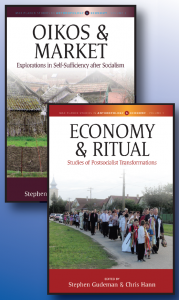 The following is a guest blog post written by Stephen Gudeman, Professor of Anthropology at the University of Minnesota and co-editor for the Max Planck Studies in Anthropology and Economy series. Below, Gudeman discusses connections between the current Greek Crisis and the first two volumes of this series.
The following is a guest blog post written by Stephen Gudeman, Professor of Anthropology at the University of Minnesota and co-editor for the Max Planck Studies in Anthropology and Economy series. Below, Gudeman discusses connections between the current Greek Crisis and the first two volumes of this series.
The first two volumes in the Max Planck Studies in Anthropology and Economy series, which are edited by Chris Hann and myself, bring to mind the current Greek crisis. I wish I had been a fly on the wall throughout the negotiations, been able to interject a word or two, and talked to a few Greeks and other Europeans for their thoughts. From afar, I see they featured feisty personalities, as well as different visions about how economy operates, wellbeing, and the purpose of economic life. They reflect cultural differences within the Euro zone.
The magic word today is austerity, meaning reduce government deficits by cutting spending and raising taxes. Behind the scenes in the Greek controversy is the partly voiced hint that profligate spending and cronyism brought about the current state of affairs. But judging by their vote, the Greeks have had enough of austerity therapy, finding that it leads to very high unemployment, loss of savings and lowered wellbeing, although the “wise” bankers insisted on more. To me, it sounds more like medieval bloodletting.
The connection between our two volumes and the bankers’ bows to the god of austerity is indirect. In each volume we offer six studies of villages by the participants in our project. Located in former socialist nations, only one of the villages has dramatically prospered by liberation into market life and neoliberal economics. For the most part the people’s lives are relatively austere. Our first volume focuses on economy and ritual, but goes beyond looking at the monetary gains and deficits of holding ceremonial gatherings. We found that rituals can boost economic life, and at times we considered how economy itself becomes a ritual. No one witnessed a Greek style jousting tournament of bankers, for powerful financiers were far removed from the life we saw, but their beliefs and stylized actions – even outside the Euro and Common Market – affected the areas we studied. To be located literally on the edges of the Common Market, while sometimes hoping for inclusion, seemed to be as debilitating as inclusion within it has proven to be for some economies, although Spain appears to be recovering. Austerity as taking care of local material life was important in our areas, and rituals often helped.
Our second volume, Oikos and Market, bears a Greek word in the title, although we do not claim the research sites were made up of house economies with roots in ancient Greece. The connection I invoke is not to Greece but to a misapplied model. A drama critic might say that the well-paid international bankers shaking their fists at the Greeks are acting like masters of a house, warning of the need for austerity and avoidance of wastage. Typical practices of a local house economy are being thrifty, holding back from spending cash, making savings, and sometimes practicing barter (which has happened in Greece). The fly on the wall might observe that this house model is being wrongly applied to a national economy, which is not a house that must balance its budget. Sometimes central bankers should encourage spending to help the GNP recover. Many house practices are the opposite of what members in a thriving market economy must do, which is to circulate money. Are the big bankers conflating the house and market? Won’t austerity end up promoting more cronyism and larceny?
Of course, it is not that simple because the Euro is disconnected from national budgets. Why should some economies pay for the debts of another only because they share a currency? After all, the austerity supporters may argue, the people in thriving economies work harder, are more honest, and are more productive than the people in the least prosperous one. The condition of one is hardly the fault of the others. But the magical word “austerity” unites them all, even if misapplied.
The naïve anthropologist might reflect that when some national economies are organized on a large scale and one is organized around smaller and medium sized units (that are less supported by welfare and infrastructure) yet they compete and share the same currency (that disconnects fiscal control from monetary control), the result will be a Greek tragedy in which tempers are lost and misunderstanding comes to the fore. But banish this fly on the wall. In our second book we explore the oikos economy in six postsocialist villages to see some of the ways it works in struggling national markets by supplementing them as the people find ways to survive, make economy, and achieve a degree of wellbeing. The disjunctures between the national markets and these local levels are as many as on the international stage. Can we learn from one to help understand the other? The anthropologist, however, is always wary of fly swatters.
Read More About the Series Here
Stephen Gudeman, University of Minnesota
Chris Hann, Max Planck Institute for Social Anthropology (Halle)
